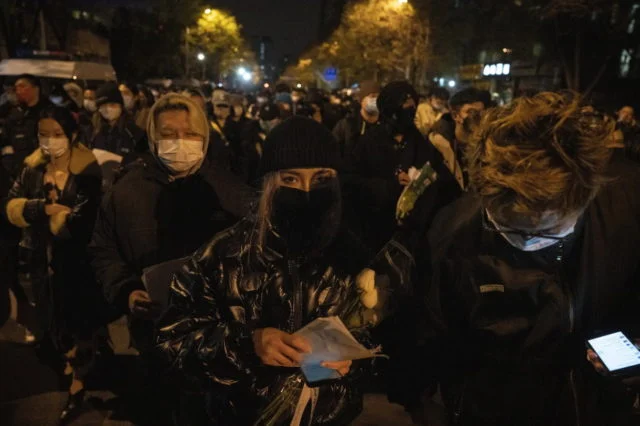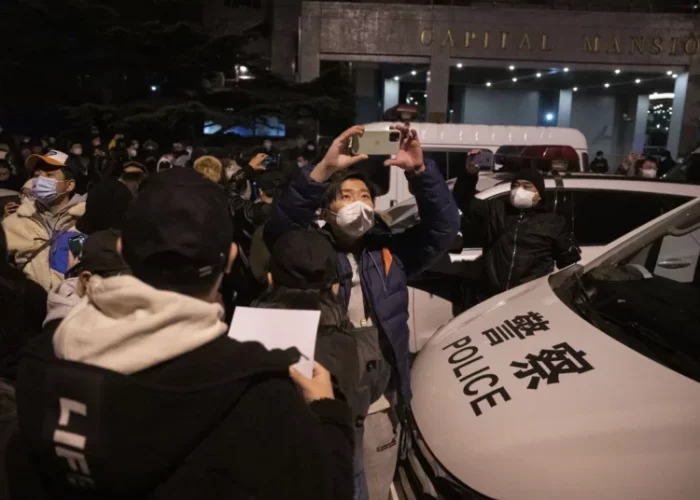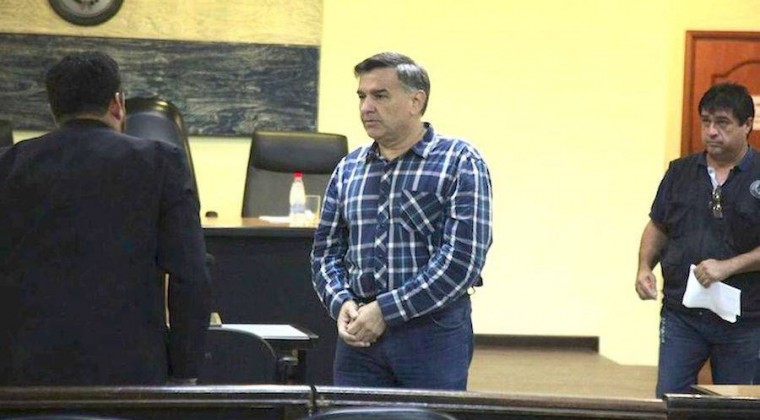Chinese security forces detained people at the site of a rare demonstration on Monday, as authorities scrambled to quell protests that have erupted across the country calling for political freedoms and an end to lockouts.
People have taken to the streets in major cities and gathered on university campuses across China to call for an end to lockdowns and greater political freedoms, in a wave of protests not seen since pro-democracy demonstrations were crushed. from 1989.
A deadly fire last week in Urumqi, the capital of China’s northwestern Xinjiang region, was the catalyst for public anger, with many blaming COVID lockdowns for hampering rescue efforts.
On Monday, Beijing accused “ultimate forces” of linking the fire to COVID measures, saying local authorities had “clarified the facts and refuted this information and slander.”
In Shanghai, in an area where protesters gathered over the weekend, AFP witnessed three people being led away from a location by police as Chinese censors struggled to erase signs of rallies on social media. .
Protesters have used the rallies to call for greater political freedoms, and some have even demanded the resignation of Chinese President Xi Jinping, recently re-elected to a historic third term at the helm of the country.

Large crowds gathered in the capital Beijing and Shanghai’s economic hub on Sunday, where police clashed with protesters as they tried to stop the groups from gathering on Wulumuqi Street, whose name in Mandarin means Urumqi.
Hundreds of people gathered in the same area with blank sheets of paper and flowers for what appeared to be a silent protest on Sunday afternoon.
The BBC said one of its journalists had been detained and beaten by police while covering protests in Shanghai, although China’s Foreign Ministry said the reporter had not identified himself as such.
A British government minister on Monday denounced the Chinese police’s actions as “unacceptable” and “worrying”.
In the capital, at least 400 people gathered on the banks of a river for several hours, with some shouting: “We are all the people of Xinjiang! Come on Chinese people!”
AFP journalists at the tense scene of the Shanghai protests on Monday saw a heavy police presence, with blue billboards placed along sidewalks to prevent further gatherings.
An AFP journalist was able to verify that three people were detained by the police at the scene, and that the security forces prevented passers-by from taking photos or videos of the area.
When asked why one of the people had been taken away, a police officer told AFP “because he had not respected our provisions”, before referring the journalist to local police authorities.
Shanghai police had not responded to repeated questions on the number of people detained on Monday.
An AFP journalist also filmed people detained on Sunday.
State censors appeared to have largely cleared Chinese social media of any news about the rallies on Monday.
The search terms “Liangma River” and “Urumqi road”, sites of protests in Beijing and Shanghai, had been removed from any reference to the rallies on the Twitter-like platform Weibo.
China’s tight control of information and ongoing travel restrictions linked to the “zero COVID” policy make it difficult to verify the number of protesters in the vast country.
However, such widespread rallies are exceptionally rare, as the authorities harshly crack down on any form of opposition to the central government.
The protests, which have spread via social media, have been fueled by frustration over the central government’s zero-COVID policy, which sees authorities imposing sudden lockdowns, lengthy quarantines and mass testing campaigns for just one month. handful of cases.
Protests also took place on Sunday in Wuhan, the central city where COVID-19 first appeared, while demonstrations were reported in Guangzhou, Chengdu and Hong Kong.
At the Beijing riverside demonstration site, where there were lines of police vehicles on Monday, a jogger in her 20s told AFP she had seen the protests on social media.
“This protest was a good thing, it sent the signal that people were fed up with restrictions that were too strong,” said the runner, who asked not to be named.
“I think the government has gotten the message and will soften the policy to give them and the whole world a way out,” he added, saying “censorship couldn’t keep up” with the news of the protests.
The state-run newspaper Diario del Pueblo published a comment on Monday morning warning of “paralysis” and “battle-weariness” in the fight against COVID, but stopped short of calling for an end to the line policy. hard.
“People have reached a boiling point because there has been no clear direction to end the zero COVID policy,” Alfred Wu Muluan, a China policy expert at the National University of Singapore, told AFP. “The party has underestimated the anger of the people.”
China reported 40,052 domestic cases of COVID-19 on Monday, a record number but minuscule compared to the number of cases in the West at the height of the pandemic.
Information of: The Times of Israel
Photo credits: PA




